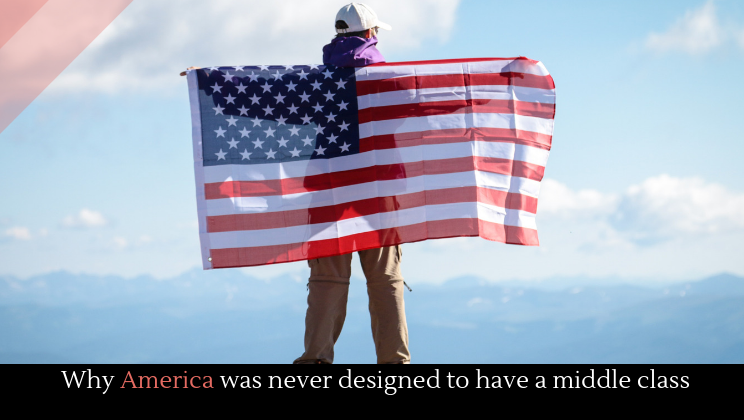Why America was never designed to have a middle class
Posted by Josh Taylor / November 9, 2018
The middle class is the center (no pun intended) of American politics. Politicians of both sides claim to be fierce defenders of the middle class. It’s no wonder that politicians do this. Depending on the study, between 70% and 90% of Americans consider themselves middle class. Appealing to the middle class is therefore a way for politicians to get as many people on board with their campaigns and agendas as possible. The problem is this: nowhere near that many Americans are actually “middle class” by most definitions, and anyway those definitions are silly.
According to a recent Pew Research Forum study, about 50% of Americans actually are middle class. Here’s how the study defined middle class:
In our analysis, “middle-income” Americans are adults whose annual household income is two-thirds to double the national median, after incomes have been adjusted for household size. In 2016, the national middle-income range was about $45,200 to $135,600 annually for a household of three. Lower-income households had incomes less than $45,200 and upper-income households had incomes greater than $135,600 (incomes in 2016 dollars).
Read that again. Upper-income households means households that earn greater than $135,000 annually. That is a huge range, especially considering the extreme wealth at the top––think Jeff Bezos, who has amassed a staggering $160 billion dollar fortune. And let’s not even talk about money for a second, because “class” is not just about money. Class is also about influence. A study out of Northwestern reveals that the nation’s elite have a disproportionate influence, and their influence is often silent:
The study’s findings shed light on how a political network of the wealthiest Americans has become powerful enough to shape U.S. politics and push the country toward ultra-conservatism. In the age of Trump, and as the country continues to move to the far right, the researchers ask why American voters are not more outraged or aware of the few wealthy people controlling the country behind closed doors.
In short, the nation’s ultra-wealthy have managed to manipulate politics, often silently, to better suit their own agendas. Meanwhile, the so-called “middle class” is being starved out of existence. That is, if you believe there’s a middle class at all. This Atlantic piece has a much more subtle discussion of class. They note that class does not equal income alone. Yes, wealth plays a part of your class, but it’s not a sole factor in defining it.
In the simplest terms (and if you’re keeping track at home, I’m borrowing ideas from sociologist Pierre Bourdieu), class is about standing in society. The high class signal that they’re high class in a variety of ways, such as going to the opera or driving supercars, but that’s not the source of their class-ness, it’s more of a method of defining themselves as above the other classes. Those who participate in upper class activities become, by definition, part of the upper-class. They see the world through that lens. Working class people, on the other hand, participate in working class activities and see the world through that lens. Thus upper class kids grow into upper class adults with upper class jobs, while working class kids do the same.
If we think about class less in economic terms and more in terms of societal influence, the idea of the middle class becomes harder to justify. As the Northwestern study pointed out, the ultra-wealthy in America have more practical influence than the people, and the demagogues who appeal to the middle class do more to serve the ultra-wealthy than anyone else.
At this point, many readers might think that I’m making (badly) a Marxist argument. I’m not, I’m making a Calvinist one––a very old Calvinist one, actually. As every schoolchild knows, the Puritans were an important influence on American society. But what most people don’t know is that the Puritans had very particular ideas about what kind of society they were founding. John Winthrop was one of the most preeminent founders of the Massachusetts Bay Colony. In 1630, as he was sailing to that colony for the first time with a group of settlers, he delivered a sermon that has gone down in American history: A Model of Christian Charity. In it, he explains the new colony’s hopes.
First, he says that the colony was to be a place of economic balance, where “the rich and mighty should not eat up the poor, nor the poor and despised rise up against and shake off their yoke” For Winthrop and the Puritans, there were two groups: the rich and the poor. The world was so divided that “every man might have need of others, and from hence they might be all knit more nearly together in the bonds of brotherly affection.”
Much has changed in America since Winthrop landed its shores, including a massive series of religious revivals that made his own understanding of religious economics all but obsolete. Through these changes, we’ve forgotten the Puritan underpinnings of the American class system.
Interested in billionaires and business?
Thanks for sharing a amazing information.